Shola, the blind rescue dog, now helps save other puppies from blindness
New gene test helps prevent inherited blindness in English Shepherds

As a two-year-old, Shola, an English Shepherd from the UK began assisting her person, John Coombs, at search-and-rescue operations. But two years later, she was diagnosed with an incurable form of blindness. While it did stop her from working as a search-and-rescue dog, she is now saving several other English Shepherds from blindness.
Shola, now a nine-year-old, began assisting John Coombs, 72, who joined England’s mountain rescue organisation as a volunteer at age 30 and rescued several people. In an interview with American daily newspaper, The New York Times, he said, “The bond that you have is unique.”
According to New York Times, Shola was diagnosed with an inherited, incurable form of blindness called Progressive Retinol Atrophy (PRA), in 2019. The Coombs approached an eye specialist to understand her condition, and her DNA was sent to the Canine Genetics Centre at the University of Cambridge.
The researchers at the University were able to pinpoint the mutation that caused Shola’s blindness, and this led them to develop a test, to help identify potential mutations in other dogs.
Despite it being too late for Shola herself, her DNA will help breeders identify and protect future generations of her breed. In the interview with New York Times, the Coombs family recall how they suspected something was wrong with Shola.
After her first litter of puppies at the age of five, Shola began to prefer bright yellow balls. And during a nighttime search, Shola had fallen into a ditch.
“It was fairly obvious that there was something wrong,” he told New York Times.
The disease turned Shola’s eyes milky and sightless. According to researchers, this mutation is recessive, and it often presents after dogs have had puppies. PRA is a group of diseases that affect more than one hundred dog breeds, where there is a gradual deterioration of light-sensitive cells at the back of the eye.
In an interview with American media company US News and World Report, Katherine Stanbury, the lead author of the study and a researcher from Cambridge’s department of veterinary medicine said, “Once the dog’s eyesight starts to fail, there’s no treatment.
“Now we have a DNA test, there’s no reason why another English Shepherd Dog never needs to be born with this form of progressive retinal atrophy. And it gives breeders a way of eliminating the disease."
Senior study author and Cambridge veterinary researcher Dr Cathryn Mellersh, told US news, “It’s about prevention, rather than a cure, and it means a huge amount to the people who breed these dogs.”
According to reports, the test costs $62 (Dh 227.72) and involves a cheek swab from the dog, which is then sent to the lab in Cambridge for testing. “Breeders can make informed decisions with their breeding and, eventually, breed this variant out,” she told New York Times.
Shola now uses her nose and ears to guide her. She even follows the footsteps of her person, right behind them as they take a walk. The owners use the command “careful” to warn her of obstacles.
Shola’s new owner, Lindsey Coombs, the daughter of John Coombs told New York Times, “She will smell treats at 40 paces.”
Now that Shola has stopped working as a search-and-rescue dog, her daughter Dotty has taken her place.
Sign up for the Daily Briefing
Get the latest news and updates straight to your inbox






